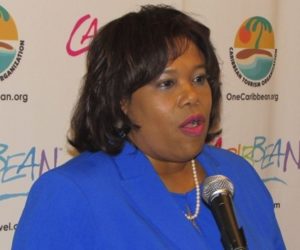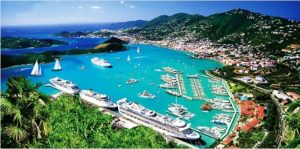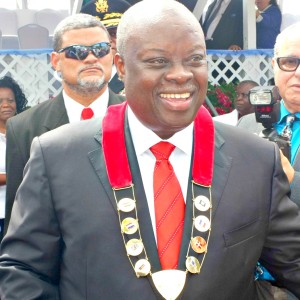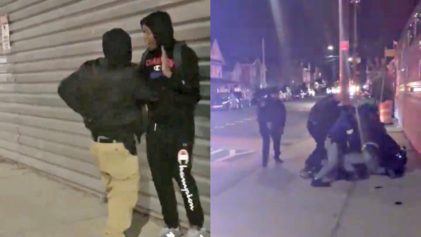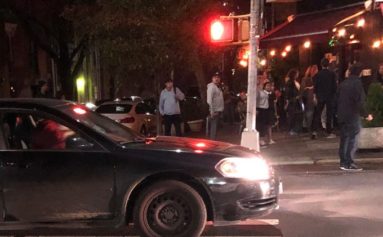Beverly Nicholson-Doty was born in St. Thomas in the U.S. Virgin Islands, lives in the territory now and recently started her third term or ninth year as the governor-appointed Commissioner of Tourism. She and newly elected governor Kenneth Mapp led a delegation on a national promotion tour in the United States to raise awareness of the beautiful vacation destination with a strong eye on business development.
Nicholson-Doty sat down with Atlanta Blackstar to share her thoughts on how she and Gov. Mapp hope to see the U.S. Virgin Islands grow in the future.
How valuable are these tours?
They are very valuable from several touch points. At the mass level, we’re seeking to connect with the consumer who will be shopping for vacation destinations. That’s always top-of-mind for us. We emphasize that there are no passports required. We are U.S. territory. Dollars are the same. We mirror the U.S. tax code. But we are an authentic, exotic Caribbean destination. Also, it is extremely important for us to utilize the resources of Virgin Islanders or people of Caribbean descent who live in the Atlanta area. At a very real level, these individuals are ambassadors.
Two, we just rolled out a Reunion Program that’s targeting the Diaspora. We’re a population that is 90 percent from the Diaspora and Atlanta is a big hub in that regard, so we’re saying many of you have been in America for 20, 30 years and have children who don’t have the connection the families back in the region. [We’re urging them] to come back home, bring your family reunions to the islands because that’s an economic driver. And the truth is, the Virgin Islands are very diverse. So these tours help create a multi-level approach where consumers see and hear us and then they read about it or see our advertisements. Atlanta is a really important market for us and Delta [Airlines] is a strong partner for us. Next winter, we will have six flights into the islands on Delta.
Being here allows us to meet with business leaders and learn what the economic areas are that can be mutually beneficial. We don’t want to be one dimensional in our approach. So, I keep our governor really busy.
What is the general impression Americans have of the Virgin Islands?
It depends on where we go. Many people in Atlanta know or are familiar with the Virgin Islands. But there are pockets in the States where we’re starting from square one and we have to explain, “Yes, we are U.S. No, you don’t need a passport, etc.” But sometimes we have to differentiate [from other islands] that it is easier to get to [us] because many people don’t have passports— getting passports for a family of four or five can be costly. We have to be very realistic about the fact that lots of people travel for business and accumulate points that they can use at the major hotels. We see that as a key component to our marketing strategy and how we speak to those individuals.
What are some of the business development opportunities in the U.S. that you seek on this tour?
We were one of the few countries that was able to take advantage of President Obama’s initiative for technology growth. Outside of New York and New Jersey, we will have the most bandwidth in the western hemisphere. So, that really opens the door for technology and financial base. Those are two of the most important areas. Certainly, as tourism commissioner, I’m always looking at those projects—either on the accommodations or attractions side—that can make good sense for economic development. And we certainly have been in the rum business for a long time, and that’s flourishing.
How does the governor plan to improve the lives of those who actually live in the Virgin Islands?
There some very targeted points. As a tourism commissioner, I’m often told we need to do things for tourists. And there is nothing that riles me more. The truth is, if a place is a great place to live, it is a wonderful place to visit. And so, all the things that are important for the people who live in the territory that are key, those are byproducts for the visitors. The infrastructure of our destinations—the roads, utilities, bringing down the cost of electricity—is important from a business perspective, but more important for our people to live comfortably. Outside of Hawaii, we were paying the highest per kilowatt for electricity at 51 cents. By the end of the year we will have brought it down to 31.
At that stage, we’ll be able to use wind technology and other approaches that will lessen it more. That’s really important for the people who live there. But it’s equally important in our efforts to drive business there because it’s a key to having a profitable business. They go hand-in-hand. Education is extremely big on our docket. We have to be certified by middle school grades with testing as we make sure our youth are reading at grade level. This is extremely important for quality of life, as it transitions into the rest of their lives. Overall, if it’s good for the people who live there, then it will be good for tourism.
In your business development pursuit, how much do you stress the opportunities for jobs for Virgin Islanders?
The entire premise on the economic development is based on job creation. With my tourism hat on, hotel development is very important because it creates many jobs. But we know we have to have jobs at all levels. We stress with colleges the value of certifications. I was kind of upset when I was in the hotel industry because when I was promoted to management, I couldn’t get tips anymore. So that meant I was making less.
One of the reasons the governor wants us to really look at the technology and financial services areas is because there are some real opportunities for higher-paying jobs and better quality of life for individuals who live in the territory. So, jobs are at the core of all we do.
In visiting islands in the Caribbean, Americans typically have this need to venture beyond the resort, to experience “the real” part of the city, where the locals live. Can that happen safely in the Virgin Islands?
Crime is certainly an issue in terms of our young men. When you look at the 15-to-35 bracket, it mirrors the U.S. It really is a real challenge for our young Black men. There is a systematic approach. The governor is a former New York police officer and we have just entered into an agreement with the New York Police Department at John Jay College to look at combating these concerns. The truth is, there is less than 1 percent of crime that impacts tourists. But Black young men are hurting each other, and that’s a very high priority to address. As a Virgin Islander and mom of a young Black man, this problem can’t be isolated from our tourism. Even the perception of crime can be a deterrent. More importantly it’s about the future of our young Black males.
There are many Arab-owned companies in the Virgin Islands, and reports are that they charge exorbitant prices that cannot be good for the residents. Is that on your radar?
Interesting that you say that, because the governor just mentioned while in Texas that as fuel prices go down, there is still an area where you’re still trying to level that area. We have to make sure the savings that are being realized by businesses trickles down to the community. What you are seeing is that we have second and third generation Arabs who were born in the Virgin Islands and they will tell you that they are Virgin Islanders. As a whole, we have to realize that any savings that we achieve has some transfer to the populace so that it betters the cost of living for our people as a whole.
Surely you want those from one of the three Virgin Islands to visit the others, but island-to-island travel is quite costly. Can that be addressed?
It’s a serious problem. In fact, inter-Caribbean travel as a whole is a challenge from the consumer side but, in fairness, it is expensive to run a business in the region. In our case, labor costs are an issue, as well as fuel and operations. That said, I strongly believe that we as a government have to encourage some strong competition. And we actually are looking at some models right now.
There is nothing better to bring down prices than competition. Right now we are not in a competitive situation between St. Croix and St. Thomas and it is a major deterrent to commerce between the islands. And as a Virgin Islander who have parents from St. Croix and who grew up on St. Thomas, we traveled back and forth, and I was as close to my cousins who lived in St. Croix. The governor is specifically addressing in scholastic sports playing against teams from other islands. It creates a connectivity, friendships and the feeling that we are one Virgin Island. But the cost of travel impedes people traveling back and forth between islands as we did, so the bonds we created are not happening. But the governor is carving out a part of the budget that is specifically for inter-scholastic travel between the islands. It’s easier to dislike someone you don’t know instead of building relationships. That often happens with sports.
Delta is a partner for travel from the U.S. to the Virgin Islands, but rates to get there are not cheap.
It depends on the time of the year. The Virgin Islands as a whole has had a pretty high demand, so prices tend to be higher in a lot of cases. What we have worked [out] is that if there is any weakness in the market at all, how can we aggressively promote it?
St. Croix is three times the size of St. John and St. Thomas combined, but has less tourism. Why is that and how can that be overcome?
We have to recognize that St. Croix originally has always been the agricultural point—very fertile ground for farming. In the 60s, we transferred that more toward industry. Tourism was kind of there, but rum, agriculture and manufacturing were the strong points. St. John is two-thirds national park and St. Thomas happens to be blessed with one of the more picturesque seaports in the region. Historically, St. Thomas has never been suited for agriculture. When Cuba closed in the 50s, we traded, as a whole, agriculture for tourism. The governor has a combined strategy of the three islands, while St. Croix has a separate brand strategy. The goal will always be to have a more diversified economy in St. Croix while St. Thomas will be a hub for tourism.
